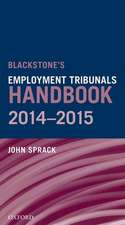How Courts Impact Federal Administrative Behavior: Routledge Studies in North American Politics
Autor Robert J. Humeen Limba Engleză Paperback – 10 feb 2012
| Toate formatele și edițiile | Preț | Express |
|---|---|---|
| Paperback (1) | 414.15 lei 6-8 săpt. | |
| Taylor & Francis – 10 feb 2012 | 414.15 lei 6-8 săpt. | |
| Hardback (1) | 944.11 lei 6-8 săpt. | |
| Taylor & Francis – 22 apr 2009 | 944.11 lei 6-8 săpt. |
Preț: 414.15 lei
Nou
Puncte Express: 621
Preț estimativ în valută:
79.25€ • 82.97$ • 65.73£
79.25€ • 82.97$ • 65.73£
Carte tipărită la comandă
Livrare economică 10-24 aprilie
Preluare comenzi: 021 569.72.76
Specificații
ISBN-13: 9780415807418
ISBN-10: 0415807417
Pagini: 174
Ilustrații: 18 tables
Dimensiuni: 156 x 234 x 10 mm
Greutate: 0.25 kg
Ediția:1
Editura: Taylor & Francis
Colecția Routledge
Seria Routledge Studies in North American Politics
Locul publicării:Oxford, United Kingdom
ISBN-10: 0415807417
Pagini: 174
Ilustrații: 18 tables
Dimensiuni: 156 x 234 x 10 mm
Greutate: 0.25 kg
Ediția:1
Editura: Taylor & Francis
Colecția Routledge
Seria Routledge Studies in North American Politics
Locul publicării:Oxford, United Kingdom
Cuprins
List of Tables. 1. Words Matter 2. The Mechanics of Review 3. How Words Matter 4. Certiorari and Other Appeals 5. Policy Change 6. Agency Nonacquiescence 7. Why Words Matter. Appendix A: Interview Procedures. Appendix B: Measurement of Key Variables. Notes. Works Cited. Cases Cited. Administrative Actions Cited. Index.
Recenzii
Winner of the 2010 Alpha Sigma Nu Book Award
"Hume asks an interesting and important question—how courts impact administrative agencies—and marshal’s impressive evidence to illuminate the process from court decision to administrative response. In short, not only do judicial outcomes matter, i.e. who wins and who loses, but more importantly the content of those decisions—the words—matter in determining how agencies respond. Highly recommended." - Artemus Ward, Northern Illinois University
"An important contribution to the study of bureaucratic-judicial interactions. Hume combines both qualitative and quantitative methodologies to great effect in examining how federal bureaucracies respond to unfavorable decisions rendered by the U.S. Courts of Appeals – the de facto courts of last resort in the federal system. The author convincingly demonstrates that, while bureaucracies are driven by their policy preferences, they also show great deference to court decisions. Written in a vibrant manner, this book illustrates that agencies are best viewed as both self-interested actors and as networks of professionals who occasionally set aside politics in an effort to serve the public interest. - Paul M. Collins, Jr., University of North Texas, author of Friends of the Supreme Court: Interest Groups and Judicial Decision Making
"This book brings to bear rigorous evidence in the investigation of an important question that has implications for judicial legitimacy, administrative compliance, and the separation of powers. Though the approach is rigorous, the author makes sure it is also accessible to both a scholarly and lay audience. In sum, it is a terrific book that is sure to inform and engage." - Wendy L. Martinek, Department of Political Science, Binghamton University
"Hume asks an interesting and important question—how courts impact administrative agencies—and marshal’s impressive evidence to illuminate the process from court decision to administrative response. In short, not only do judicial outcomes matter, i.e. who wins and who loses, but more importantly the content of those decisions—the words—matter in determining how agencies respond. Highly recommended." - Artemus Ward, Northern Illinois University
"An important contribution to the study of bureaucratic-judicial interactions. Hume combines both qualitative and quantitative methodologies to great effect in examining how federal bureaucracies respond to unfavorable decisions rendered by the U.S. Courts of Appeals – the de facto courts of last resort in the federal system. The author convincingly demonstrates that, while bureaucracies are driven by their policy preferences, they also show great deference to court decisions. Written in a vibrant manner, this book illustrates that agencies are best viewed as both self-interested actors and as networks of professionals who occasionally set aside politics in an effort to serve the public interest. - Paul M. Collins, Jr., University of North Texas, author of Friends of the Supreme Court: Interest Groups and Judicial Decision Making
"This book brings to bear rigorous evidence in the investigation of an important question that has implications for judicial legitimacy, administrative compliance, and the separation of powers. Though the approach is rigorous, the author makes sure it is also accessible to both a scholarly and lay audience. In sum, it is a terrific book that is sure to inform and engage." - Wendy L. Martinek, Department of Political Science, Binghamton University
Descriere
What impact do federal courts have on the administrative agencies of the federal government? How do agencies react to the decisions of federal courts? This book answers these questions by examining the responses of federal agencies to the U.S. Courts, revealing what happens inside agencies after courts rule against them.






















